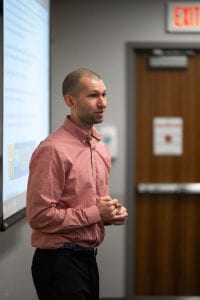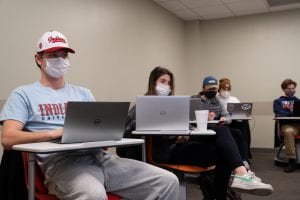
Professor Brian Williams

There are increasing amounts of data in the world, but the data doesn’t mean anything unless you understand how to use it. That’s why in spring 2022, IU’s Accounting Department chose
to launch a new Accounting Analytics course that takes a conceptual approach to understanding data and understanding how to use accounting metrics and accounting data in a way that will inform decisions. The eight-week, one-credit hour course is one of the first courses of its kind according to IU Professor Brian Williams, who taught the inaugural course in the spring.
IU Professor Jeff McMullin will be teaching it in the fall. Prior to launching the course, he and Williams conducted a survey of the top 50 accounting programs’ curricula and determined
that fewer than 10 percent had a data analytics course, let alone an accounting-focused analytics course.
“The data analytics courses that are being offered at other schools often focus on how to use the tools and not the conceptual thinking of, ‘What’s the business problem we’re trying to answer? What data will allow us to answer it? And how do we do the analysis and then communicate our insights?’” says McMullin. “It’s more of a holistic approach to doing analytics.”
Accounting students and accounting professionals have an advantage for bridging that process. Because they have knowledge in all different aspects of the process, they’re in a good position to manage it and leverage the insights that are in the data using this framework.
Rather than offering students just one analytics class, the department decided to offer this introductory-level course and then students will revisit what they have learned in that class in every subsequent accounting class they take.
“It’s not just a one-and-done analytics education,” says McMullin.
This means they will learn how to apply analytic concepts to their tax ideas in tax class and then do the same thing when they get to their auditing and managerial classes.
“Students will be constantly applying the analytic framework to these different problems and communicating insights about various aspects of accounting so when they graduate, they will have applied the data analytic framework at least a dozen times,” says Williams.
As a result, when students enter the workforce, they’ll be ready from day one to start providing insights from data to their employers or clients. “The actual analysis and the communication of the results will be second nature to them.”
Because the department will be offering more analytics throughout the classes, that necessitated that the faculty upskill their analytic skills as well as learn how to write and deliver analytics cases. Therefore, over the course of the spring 2022 semester, McMullin coordinated six training workshops for faculty to learn about analytics and to study examples of good analytics cases. They then worked in groups to develop a case for each of the classes.
“All of the professors who are teaching the same class will teach the same case so it’s a big coordination effort,” says McMullin. Assistant professor Ashley Sauciuc feels that accounting and data analytics naturally go hand-in-hand.
“As accountants we use data every day to track performance, establish incentives, and communicate financial results,” says Sauciuc, who teaches cost accounting. “Students in my
class focus on merging data analytics with accounting through a group project. Over the course of the semester, they acquire real-world data from various sources and incorporate
analytic tools to help them estimate future costs and forecast budgeted performance for several homebuilding companies. Each year, students impress me with their enthusiasm to enhance their analytical skills on this complex project.”
Associate professor Jason Brown, Ernst & Young Faculty Fellow, notes how helpful it is to see how others integrate data analytics into their courses.
“Although we all teach different courses, the discussion of best practices regarding the use of data analytics in our respective courses allowed all of us to learn from one another,” he says.
Additional workshops are forthcoming this fall.
“We want to make sure that the content of the cases being offered across the subsequent classes covers what needs to be covered,” says McMullin. “Plus, as new methods come
out in the analytics space, our faculty will be aware of those and be able to incorporate them into their courses.”
Student response to A355 has been overwhelmingly positive.
Accounting major Jessica Janek says the course was so engaging that she wished it were longer than eight weeks. She was also pleased with the relevance of the coursework. In fact, one day before class started, Janek was scrolling through her LinkedIn feed when she saw an article that one of the Big 4 firms bought stock of Ethereum for the first time. It was exactly what they were learning in class. When class began a few minutes later, that article was the first thing her professor pulled up.
“We had just learned about cryptocurrencies and distributed ledgers, and then a huge firm bought crypto,” says Janek. “I really appreciate that in this course we aren’t learning from a textbook but about the real world. The world is changing so fast, and the world of accounting as we know it is going to be very different in the near future. Students here [at IU] will have a step up in comparison to students at other universities because this course is very cutting-edge.”
Sal Cohoon, an accounting and business analytics co-major, was eager to take this course since it incorporates both of his areas of interest.
“The biggest takeaways I encountered are not only how to deal with accounting in a descriptive, diagnostic, predictive, or prescriptive sense, but also how to interpret these themes in accounting and take them a step further,” says Cohoon, who also finds the course’s real-world application invaluable. “Professor Williams goes above and beyond by providing current events and articles pertaining to our class topics, taking hours to create his own examples for class, whether that’s by using real-world data or self-made data.”
Like Janek, Cohoon wished the class lasted longer. “It’s been one of my top three classes I’ve taken while at Kelley,” he says. “The relevant knowledge I’ve gained from it has been
tremendous.”
Leave a Reply